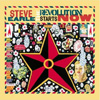




 |
 |
Where You Lay Your Money Down
This Week: Steve Earle fires the first shot and Mouse on Mars goes pop

Steve Earle
The Revolution Starts Now (Artemis Records)
There are worse things than being boring, or self-righteous, or assuming that because you can write good songs you should start writing poetry. So maybe my aversion to Steve Earle the last few years has been slightly irrational. But there’s no denying that he has been repeating himself, or that his political outrage, however much you may agree with it, has bordered on obnoxious, with the martyr-complex liner notes and the preachy interviews, or that he really, really, please God, should stop writing poetry. (Not to mention that “John Walker’s Blues,” despite a compelling premise and tons of salivating press, was a dud, and didn’t provide much more insight than the mainstream media’s consensus profile of John Walker Lindh.)
That said, I’m listening to his new album, The Revolution Starts � Now as something of a comeback. Earle still draws definitive political lines, but stark delineations make more sense now, during an ill-conceived war and a heated election campaign that may serve as a referendum on that war, than they did in the aftermath of Sept. 11, 2001.
Revolution has its share of dumb moments. “Condi, Condi” is a love song, presumably to Condoleezza Rice, with an embarrassingly stilted reggae arrangement, and an even more embarrassing lack of relevance. “Warrior” is a spoken monologue, in faux-Shakespearean language, that drips with nostalgia for real wars, when men were men, and all that. I haven’t decided on “F the CC” yet. It’s a rousing rock song—fast and short and loose, and, yeah, F the CC. I’m with him there. But I’m not sure the FCC should be conflated with the FBI and the CIA. Maybe Earle just can’t quite pull off the punk rock sloganeering.
Earle also treads ground he’s covered before—a couple of slow, simple songs (“Comin’ Around,” with Emmylou Harris, and “I Thought You Should Know”), story songs about tough men in hard places (“The Gringo’s Tale,” “Home to Houston”)—but with enough craft and heart that at least “The Gringo’s Tale” is as good as any of its antecedents.
The title track (and its reprise as the album closer) is—surprisingly—thoughtful, and even puts Earle’s political advocacy in a perspective that might make me admire him more. Instead of a diatribe, an easy, throwaway reference to political uprising, it’s about politics as real life: “The revolution starts here/ Where you work and where you play/ Where you lay your money down/ What you do and what you say/ The revolution starts now.” It’s not a new idea. It’s not even very artfully stated, sung as it is over a droning, vaguely psychedelic guitar line. But it’s the best thing I’ve heard from Steve Earle in a long time.
—Matthew Everett

Mouse On Mars
Radical Connector (Thrill Jockey)
Electronic music releases are kind of like magazines. You’re excited whenever you get a new issue, which is then summarily devoured and eventually forgotten.
Mouse On Mars is like the McSweeny’s of electronic music. Its sonic publications come out less often, are much more tightly edited, and possess infinite staying power.
The Martian rodent population has been creating exciting electronic music for over a decade now, with each release sounding different, new and challenging. Known for its playful, organic style which utilizes tweaked versions of recorded, acoustic sounds, MOM continually thrills with a new approach every time around.
This time out, MOM has made a “pop” record. Yep, there’s lead vocal tracks, lyrics and the whole shebang.
Mouse On Mars’ take on pop won’t garner any mainstream radio play, however, because there is nothing standardized about the group’s approach.
Radical Connector’s vocal tracks are sent through the same computerized blender as each and every sound Mouse on Mars has ever encountered. With lyric sheet in hand, you can probably figure out what the vocalist is trying to say, but why bother?
I’m sure there’s some kind of schematic message to the album, but I’m not too concerned about figuring out exactly what it is. Bottom line, this is artfully wrought ear candy. What makes the album “pop” is that it’s accessible. But don’t be seduced by the easy access paradigm. There’s something more lurking within. I’m not sure exactly what that might be, but I’ll certainly figure it out as I continually listen to this excellent release. File this one in the post-post-postmodern department.
—John Sewell

September 9, 2004 • Vol. 14, No. 37
© 2004 Metro Pulse
|
|